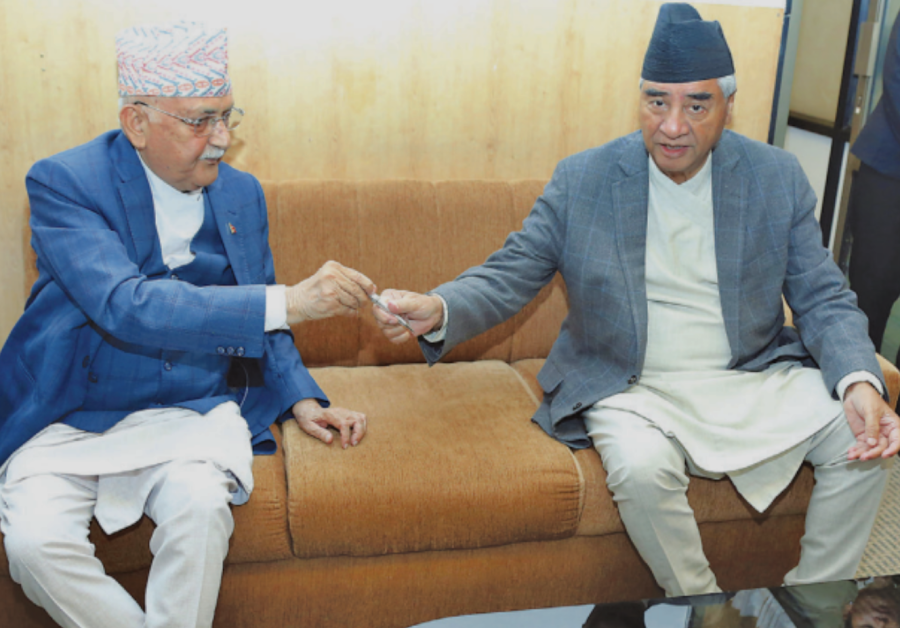Politics
Congress voices reservations over Oli’s remarks against constitution revision plan
Leaders of the coalition partner say the prime minister cannot speak against the two-party agreement without consulting the largest party. Oli had said the plan to amend the constitution had been deferred until 2087 BS (2030-31).
Post Report
A day after Prime Minister and CPN-UML Chairman KP Sharma Oli said that amendments in the constitution are not possible before 2030, the key ruling ally, Nepali Congress, has voiced its objections.
Speaking at the concluding session of the party’s central working committee meeting on Tuesday, Oli surprised many by saying that the plan to amend the constitution had been deferred till 2087 BS or 2030–31 AD. Oli's remarks came as a surprise to the Nepali Congress, the largest party in the ruling coalition.
But no one knows why Oli did a volte-face after six months of leading the government and spoke publicly about such a sensitive matter without consulting with the Nepali Congress, Congress leaders said.
Congress President Sher Bahadur Deuba and other leaders plan to meet Oli to discuss his remarks and ask why he chose to speak against the spirit of the seven-point agreement signed between the two largest parties prior to this government’s formation in mid-July last year.
The statement is in contrast to what the Congress and the UML agreed in July, when the largest party made Oli the prime minister. The key agenda of the seven-point agreement was to amend the constitution to devise an electoral system that’d produce stable governments, among other things. Recently, both parties also decided to form a task force to suggest the constitutional provisions that need to be reviewed and amended.
“In the midst of these developments, we were surprised to suddenly hear Oli’s statement yesterday,” a senior Congress leader said. “Now it is the job of party president Sher Bahadur Dueba, General Secretary Gagan Thapa and other leaders to find out what Oli’s statement means.”
“The constitution will only be amended in 2087 BS [2030 AD],” Oli said on Tuesday, about the charter promulgated in 2015, seven years after electing the first Constituent Assembly in 2008. “It is not possible before that. You must be aware of [our] strength in the National Assembly,” said Oli. “That is why an amendment is possible only in 2030.”
Since the main opposition, CPN (Maoist Centre), is currently the largest party in the National Assembly, it is difficult for the Congress-UML coalition to muster the two-thirds majority necessary to amend the constitution. The amendment requires a two-thirds vote in both the House of Representatives and the National Assembly.
Elections for the upper house are held every two years. The last vote was in 2024. Members of provincial assemblies, and chiefs and deputy chiefs of local governments are the voters. Provincial and local elections will next be held in 2027. By 2030, all the current Assembly members will retire.
Speaking at a party event in Jhapa on Wednesday, Congress General Secretary Bishwa Prakash Sharma objected to Oli’s statement which he made during the concluding session of the UML central committee meeting.
“If you mean that the constitution amendment is only possible in 2087 BS, then one should speak only after a consultation between the Congress and the UML,” Sharma said. “Without proper consultation with the Nepali Congress, the UML chairman does not have the right to say that a constitution amendment is only possible in 2087 BS.”
There are several other Congress leaders who are puzzled by Oli's statement too. In private conversations, some of them question the rationale and credibility of the Oli government if it backtracks on its commitment made publicly six months ago.
Even some UML leaders are in confusion after Oli's statement, a senior Congress leader said. They also have difficulties on how to defend the agreement and consensus reached between the two parties “who have made several commitments to the people” from various forums over the past six months.
“If the prime minister stated that constitution amendments will happen only by 2087 BS, let me put forth my gentle reservations in his own district,” said Sharma. Both Oli and Sharma won House seats from Jhapa in the 2022 general elections.
Because the Congress-UML coalition does not currently have a two-thirds majority in Parliament, it is not possible to make changes in the constitution without taking smaller parties on board. For that, they will have to wait until the Congress and the UML have a two-thirds majority in the federal parliament. It requires a two-thirds majority in both houses to make changes in the constitution.
During the time of signing the seven-point agreement, “we agreed that amending the constitution is the need of the hour”, said Sharma. “In the same spirit and on that basis, we have to reassess and reconsider the agreement.
“It is also true that without the Maoist Centre’s support, we cannot amend the constitution because we don't have two-thirds votes.”
The two parties cannot backtrack on the agreement to amend the constitution just because they lack the required numbers, said the Congress general secretary.
While amending the constitution, Sharma suggested, the parties need to take note of the expectations of the people and party workers.
“When we signed the agreement in mid-July, we decided to amend the constitution after reviewing it," said Sharma. “I want to remind here that it was an agreement between our party president and the prime minister, which they must adhere to, taking all the political parties into confidence.”
Min Bishwakarma, the head of the Nepali Congress’ publicity department, said the party has yet to discuss the prime minister’s statement.




 29.39°C Kathmandu
29.39°C Kathmandu














